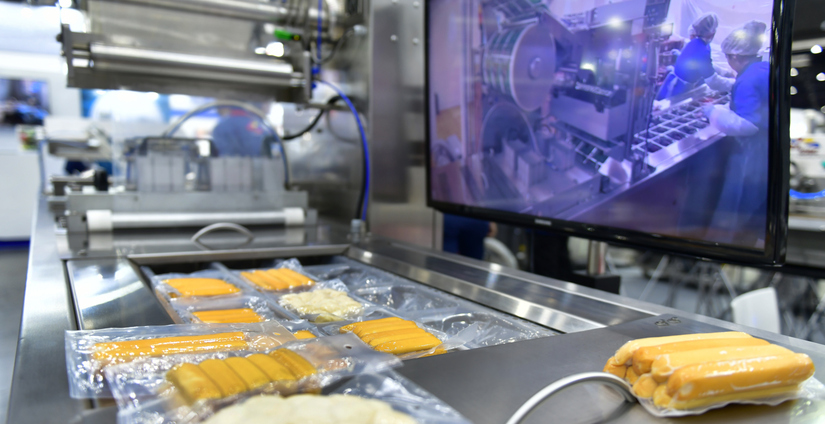The food industry is a complex and challenging sector that requires a high level of efficiency and accuracy to maintain growth and profitability in any country. The sector faces numerous challenges, including supply chain management, food safety, regulatory compliance and changing consumer preferences.
To overcome these challenges, food businesses need to adopt effective Enterprise Resource Planning (ERP) solutions that streamline their operations and enhance their decision-making capabilities. ERP solutions provide a comprehensive platform that integrates all the aspects of the food industry, from production to distribution, enabling businesses to improve their performance and meet the demands of the market.
This post will explore the role of ERP solutions in overcoming challenges in the food industry and how they help your business optimize its operations, reduce costs and improve customer satisfaction.

The Importance of ERP In Food and Beverage
Improvements in the Manufacturing Process
ERP solutions have become a game-changer in the manufacturing industry, revolutionizing manufacturing practices by improving efficiency, productivity and agility through the concept of process automation. Improvements in the manufacturing process are a crucial benefit of ERP solutions in this industry.
ERP systems provide accurate real-time data, enabling leaders to make informed decisions. The software makes it possible to monitor production activities, track inventory and manage the supply chain process, all within a user-friendly menu and dashboards. With this level of control over operations, manufacturers can make adjustments to their manufacturing processes on the fly, leading to more efficiency and leaner production practices. ERP software also provides better resource utilization by managing inventory levels, thus reducing waste and eliminating bottlenecks. Improved communication and workflows between different departments enable coordination of all aspects of manufacturing, resulting in efficient and error-free production processes, improved operational performance, increased sales and the generation of new revenue streams for your business.
Increases in Production Efficiency
Another significant benefit that ERP systems provide to the food and beverage industry is an increase in production efficiency. With ERP systems in place, manufacturers reduce downtime and waste while increasing output. By automating various workflows, such as inventory management, order processing and scheduling, ERP software ensures that production runs smoothly and is aligned with demand. This, in turn, enables food & beverage companies to save time, reduce costs and enhance the quality of their products.
Additionally, ERP software provides valuable insights into production performance, highlighting areas that need improvement and helping manufacturers make data-driven decisions. The best consultants are able to analyze and offer recommendations to enhance operational, sales and production performance, which in turn results in increased financial success for your business.
Enables Traceability and Control Over Inventory
Another key benefit of implementing an ERP solution in the food manufacturing industry is the ability to enable traceability and control over inventory. With accurate tracking and management of inventory, your plant optimizes its production processes, reduces waste and avoids costly stockouts. Furthermore, with a comprehensive ERP system, you can easily track the movement of products throughout the supply chain, ensuring that they are meeting industry standards and government regulations for food safety and quality. This level of visibility also makes it easier for you to address possible recalls and respond to any quality or safety issues that may arise. Additionally, it enhances your marketing efforts by providing valuable data insights that can be used to target specific customer segments and tailor your promotional strategies for maximum impact and development.
Reduces Raw Materials Waste to Minimize Production Expenses
With complete visibility into the supply chain and production processes, an ERP system analyzes inventory levels, forecasts demand and supply and minimizes raw material wastage to optimize production output. This translates into lower production expenses, improved efficiency and reduced shelf-life variability. By enabling real-time data analysis and informed decision-making, ERP systems help drive growth and development strategies in your company. They optimize procurement strategies, streamline production processes and improve sales and marketing services, ultimately reducing overhead while improving income.
Improves End-To-End Vendor/Supplier Management
By implementing an ERP system, your company is able to streamline its entire supply chain management, from procurement to inventory management to order fulfillment. This increased visibility and control over the supplier relationship allows your company to optimize its procurement process, reduce expenses and improve product quality.
Furthermore, ERP systems have the greatest impact on product development, helping you outpace the competition. They enable your firm to easily track vendor performance, manage relationships with customers in real-time and provide valuable insights into supplier collaboration and performance.
Controls Food Quality Internally and Throughout the Supply Chain
The concept of controlling food quality throughout the processes is a major challenge for the food & beverage sector. However, with the help of ERP systems, this challenge can be easily addressed. ERP systems enable your organization to track and monitor food quality offerings in real-time, throughout all stages of production, from raw ingredients to finished products.
With an ERP system in place, food & beverage manufacturers closely monitor the entire supply chain and identify any areas where quality control may be lacking. This helps to resolve any issues before they become larger and more complex problems. As a result, ERP software provides complete visibility and control throughout all processes, ensuring that food quality is maintained at all times. This not only helps improve customer satisfaction but also helps in reducing wastage and production expenses, ultimately leading to increased profitability for the organization.
At Ultra Consultants, we leverage our real-world experience in software for food and beverage manufacturing. Our consulting services assessment helps you achieve maximum benefits through specific ERP systems for manufacturers. We understand the unique challenges and requirements of your industry, including development and marketing. By partnering with us, your business optimizes its operations, streamlines processes and services and enhances financial success through the effective utilization of your ERP solution.

Key Focus Areas for Food and Beverage ERP Consulting
1. Regulatory Compliance and Quality Assurance
Regulatory compliance and quality assurance are crucial areas of focus for food and beverage consulting. With an increased emphasis on food safety, federal regulations and guidelines have become more stringent, and your business must ensure it is in compliance with all relevant laws. Quality assurance is also paramount for your company to maintain its reputation and consumer trust.
Food and beverage consulting firms provide valuable consulting services, software intelligence and critical capabilities assessments to grant insight in these areas. For example, our team leverages ongoing research, regular software vendor briefings and project technology selections to determine and develop a deep understanding of your business’ unique functional requirements. Utilizing this knowledge, we recommend and implement ERP software to improve compliance and quality assurance processes, ensuring that your business remains in compliance with regulations while also producing high-quality products.
2. Demand Forecasting
Demand forecasting is another crucial focus area for food and beverage consulting services. With the increasing complexity of global supply chains, your business must make accurate predictions of future product demand to ensure efficient and profitable operations. By implementing demand forecasting technology, your company optimizes its production schedules, manages inventory levels and reduces waste.
With a deep understanding of the food & beverage industry and ongoing research, the best consultants are uniquely positioned to assist your business in selecting and implementing the right demand forecasting software. With valuable software intelligence and critical capabilities insight, consultants can guide you through the technology selection process, ensuring that you choose a solution that meets your unique functional requirements.
In such a complex industry, demand forecasting is an essential tool for achieving long-term success and tapping into both old and new markets. Great consultants offer food & beverage consulting services and are well-equipped to provide the necessary expertise to help your business thrive.
3. Recipe and Formula Management
Successful food businesses rely on the consistent delivery of high-quality products to maintain their reputation in the market. In food & beverage, ingredients are a crucial component in the success of your company. They not only help create a diverse range of options for your customers but also serve as an opportunity to review and improve your offerings based on client feedback and market trends. Managing recipes and formulas is a complex task that involves ensuring that recipes are standardized, ingredients are high-quality and yield is predictable.
Food and beverage consultants work with your staff to optimize your key products, formulas and production processes to increase efficiency while maintaining the desired product quality. Recipe and formula management directly affect the profits you make by controlling ingredient expenditure, minimizing waste and maintaining consistency in product flavor, texture and appearance. Having specific F&B ERP software can help you establish a process for recipe development and marketing, thus making sure you stay ahead of the competition.
Effective recipe and formula management also facilitates product innovation, helping food and beverage businesses in creating and responding to changing consumer preferences and market trends. Therefore, recipe and formula management is a key area for food and beverage consulting to help manufacturers develop and maintain competitive advantages, new revenue streams and bottom line profits by leveraging available resources in the marketplace.
Conclusion
In conclusion, ERP systems play a vital role in overcoming the challenges faced by the food industry. By streamlining operations, optimizing supply chain management, enhancing traceability and compliance and improving overall visibility across the network, ERP systems empower organizations to make informed decisions that drive growth, profitability and client satisfaction.
With modern ERP software becoming increasingly accessible and relevant to the food industry, organizations of all sizes are able to leverage these transformative technologies to stay competitive and meet the evolving specific needs of their customers. As such, it is imperative for food companies to choose ERP partners with real-world experience, then embark on a digital journey that empowers them to thrive in an ever-more-competitive marketplace. This range of options allows your organization to optimize its operations, make money-saving decisions and make the most of its profits.
Who We Are
The Ultra Consultants team has been providing food and beverage consulting services, including market research and customized training, for more than 20 years. This extensive experience has allowed us to partner with and serve a wide variety of clients, providing valuable insights and establishing long-lasting relationships throughout the industry. Whether you need a new ERP or want to know how best to optimize your existing system, allow our consultant team to dive into the dynamics between menu engineering, menu-mix analysis, suppliers and procurement and cost analysis at your facility to achieve success. Let us get to work for you and help optimize your operations for maximum results.
Table of Contents
More ERP material...
Generative AI in Manufacturing
This post will examine why managing quality records outside of an ERP…
AI in Food and Beverage Manufacturing
Discover how AI is revolutionizing food and beverage manufacturing, enhancing quality, reducing…
How ERP for Quality Control Eliminates Manual Documentation Chaos
This post will examine why managing quality records outside of an ERP…



